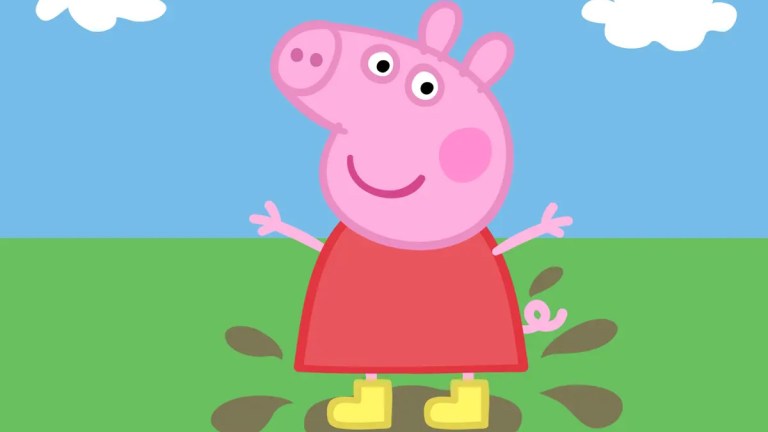Waking From the Peppa Pig Nightmare
There is an end to it. We promise.

I fidget on the couch, avoiding eye contact. My therapist leans forward.
‘And the cheerful anthropomorphic cartoon pig for children,’ they say, kindly. ‘Is she in the room with us right now?’
You may be familiar with Peppa Pig, the British children’s animation that began airing in 2004. Perhaps you picked up on its existence by osmosis, as part of the broader pop cultural landscape. Perhaps you were young enough to watch it as a child, and are now old enough to be reading personal essays about it online, in which case excuse me while I crumble into dust.
Or perhaps, like me, you are a parent. In which case, solidarity. I see you. My son, who will soon turn six, was into Peppa Pig for several years. Really into it, in the way that only children can be really into something. This was not our intention. It was not some beloved fixture of our own childhoods that we felt compelled to share. It just kind of happened.
Non-parents may wonder how such things can just ‘happen’. Surely parents – grown adults, the people who can operate the remote control – have full dominion over their child’s media consumption? Surely we can just say no?
You can’t hear, but I am laughing. Low, hollow and bitter.
Just so we understand each other, let me state plainly that I do not care for Peppa Pig. Happily, my son has lost interest in the show, and her foul influence in our home has waned. But scars take longer to fade, and as new light comes streaming through the windows, I find myself struck with a wondrous, terrible clarity. I find myself wrestling with what it all meant. What have I been through? How have I changed? Was it actually that bad?
In case it wasn’t clear – in my opening analogy, the therapist is you.
A Peppa Primer
Peppa is an anthropomorphic animated piglet, perpetually aged around four. She lives with her parents and younger brother George in a world populated almost entirely by other anthropomorphic animals – sheep, rabbits, cats, mice, pandas, zebras, gazelles, foxes, giraffes and so on – though some animals – like tortoises, fish and ducks – are, for reasons unknown, lesser, and are often kept by the other animals as pets.
There is a vet called Doctor Hamster, though. So apparently whatever capricious god rules this universe deemed hamsters worthy of uplift. Why them but not ducks? Why do fish not deserve true sentience? Stop asking questions.
There are also a couple of human beings – Father Christmas and the Queen, who is directly based on Queen Elizabeth II, though I’m not sure how the show has addressed her recent passing – and a giant talking potato, whose sole purpose is to encourage children to eat their vegetables. Which, considering his status as a vegetable, seems somewhat perverse.
Also, the only music that exists in the show’s universe is variations of the theme song. Band playing? It’s the theme song. Character whistling while they do chores? Theme song. School kids messing around with instruments? Theme song again. It’s really quite unsettling.
You can put the rest together for yourself. They have adventures (a term I’m really stretching to breaking point here), events occur, everyone falls over laughing at the end. It’s a children’s cartoon.
So, what’s my beef? What is it about this particular children’s cartoon that has radicalised me?
The Pig Girl
Let’s start with Peppa herself. I will say this for the girl – she’s not as insipid as Bing.
What she is, however, is a smug, selfish, rude, egotistical bully. And while that’s arguably not out of character for some small children, Peppa Pig is not a documentary about small children. It’s a kids’ cartoon, and in kids’ cartoons, bullies need to learn their lesson.
But Peppa never does. She is never condemned for her bad behaviour. Her cruelty to George goes unpunished. Nobody ever calls her on her bullshit, least of all her wetwipe parents. The show imparts no moral critique.
The closest she comes to getting her comeuppance are episodes like ‘Whistling’, where she is embarrassed because everybody can whistle except her, or ‘Bicycles’, where she is embarrassed because she is the only one whose bike still has stabilisers. But even there, she doesn’t learn any kind of humility. At the allotted time, when the episode needs to wrap up, suddenly she can whistle. Suddenly she can ride a bike without stabilisers. No emotional or ethical journey is articulated. As with all the show’s attempts at drama, problems are just kind of solved by default. I’m not asking for perfect Aristotelian unity from Peppa Pig, but come on.
And come the following episode, Peppa is back to her old self. Mocking her baby brother, boasting about how good she is at everything, lording it over her friends, fat-shaming Daddy Pig (we’ll come to Daddy Pig). She is a terrible role model for children. In fact, I wouldn’t be surprised if some older kids learned some pretty bad habits from her regarding how one treats a younger sibling.
But of course, like all children, Peppa is a product of her environment. So let’s take a look at that environment.
The Ugly Ethical Landscape of Daddy Pig
Daddy Pig is the pits. A buffoon, a blowhard, a risible figure. The perfect cliché of the ineffectual sitcom dad. A man fond of declaring himself ‘a bit of an expert’ at things, then proceeding to demonstrate that he is at best an amateur, and at worst dangerously inept. And does he ever learn his lesson? Of course not! No wonder Peppa is the way she is.
But we must also feel a measure of sympathy for Daddy Pig, piteous hog that he is, because he is regularly, gleefully fat-shamed by his family, including his wife. This fatphobia is part of a nasty reactionary streak running through the show, which elsewhere manifests as aggressive heteronormativity (e.g. an episode whose drama hinges on Daddy Pig’s white football shirt turning pink in the wash, because a man couldn’t possibly wear a pink shirt to play football) and anti-intellectualism (e.g. in the figure of Edmond Elephant, a precocious child who is constantly dismissed – even by the narrator, the nominal moral centre of the show – as a ‘clever clogs’).
Contrast this ugly ethical landscape against something like Bluey. Bandit, Bluey’s dad, can be a bit of a buffoon, but he’s also a great dad. He loves his children – and when those children misbehave, they learn their lessons. They grow. And this growth is built upon a foundation of mutual respect, love, and strong values.
Peppa Pig is a moral vacuum in comparison.
Who’s Really to Blame?
If you’re still reading, congratulations! I’m nearly done. Let’s conclude by zooming out a little.
Children’s entertainment can be magical, deftly threading many challenging needles, providing a transcendent and formative experience for children while also offering some nourishment to their parents. Art created with love and care and respect.
Peppa Pig is not that. It is banal. It is tedious. It has none of the gentle whimsy of Sarah & Duck, the anarchic invention of Hey Duggee, the emotional articulacy of Bluey. The animation is crude. The character designs just about make sense in an animated context, but if you want some proper nightmare fuel, look at what happens when you try to translate them to real life.
Or, indeed, make them face the front.
In the interests of balance I’ll admit that there are some okay jokes in Peppa Pig. The fact that Miss Rabbit does basically every job, from taxi driver to helicopter pilot to dental nurse, is a touch of subtle surrealism that I enjoy. Then there’s this moment from the aforementioned ‘Whistling’ episode:
That’s it.
More than anything though, the show feels lazy. It stinks of product. It stinks of this will do, because kids will watch anything.
And yes, kids like Peppa. They love Peppa. Of course they do! Kids can be discerning and appreciate good quality entertainment, but that doesn’t mean they’re pre-programmed to do so. You can put some pretty shoddy guff in front of them and they’ll happily watch it for hours. Just look at the popularity of Blippi (luckily for you, my essay on Blippi won’t be appearing here, because Den of Geek simply won’t allow that much cursing).
This is not their failure. The children are not at fault. We are. The adults. The parents who resignedly shovel this stuff into the trough so we can spend ten minutes looking at our phones in peace. Perhaps that explains it? Enduring this nightmare is our price for allowing it to happen – the Peppa Pig penance must be paid.
Thank you for listening. I think I can finally move on now.
